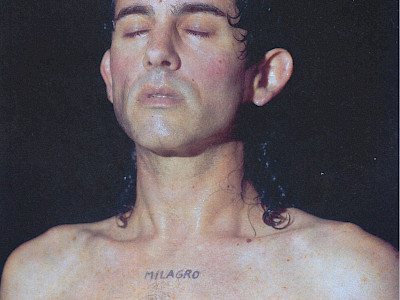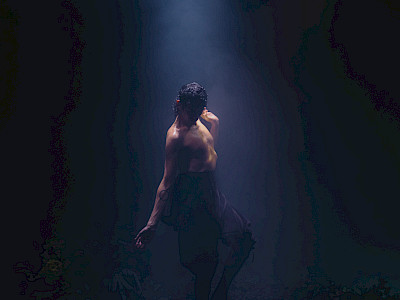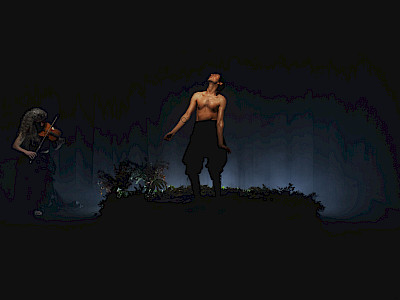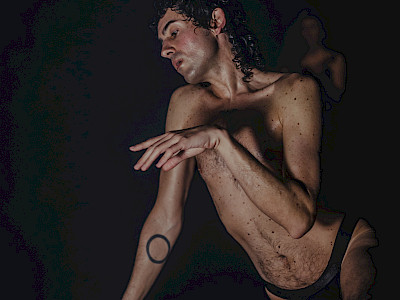09 — 12.05.2025
Alberto Cortés Málaga-Madrid
Analphabet
theatre
| Spanish → FR, NL, EN | ⧖ 1h10 | €18 / €15 | Contains nudity
After two lovers argue loudly on a beach at sunset, a ghost named Analphabet appears over the sea to tell his story and sing songs to the couple. Alberto Cortés, a revelation in the art landscape, calls himself a marica andaluza ('Andalusian faggot'), highlighting the off-centre perspective that has allowed him to develop a singular language. Invited to open the festival, he presents Analphabet, the story of a ghost who roams cruising spots, the outdoor spaces for sexual encounters between men.
With haunting prose, Cortés crafts a character born to heal toxic relationships, partially reflecting his experience of being called 'irrational', a label he defiantly reclaims with this piece. Inspired by José Bergamín’s La decadencia del analfabetismo, Cortés criticises a society that sacrifices poetry for rational order, where everything must be organised, legible, and fixed, like the alphabet.
On stage, accompanied by violinist Luz Prado, Cortés is magnetic; his body vibrates as if words flow through him like blood, like lines in a poem, like men in the woods at night. Cruising and poetry: Analphabet clings to a world perpetually threatened by too much daylight. Perhaps there are no words, or enough letters, for a night beyond description and that promises to be an unforgettable experience.
“What is, cannot be written down”, said Alberto Cortés. So this is where this text should end, as Analphabet is now end- ed. It is already an incarnate myth, that will appear before us, those of us sitting here in front of it, looking at it, and soon, admiring it. It is even counterproductive to put a thousand words onto paper here, in order to intellectualise something that flees from reason to take refuge in intuition, in poetry, in the emotion of lovers who sow conflict in sublimely beau- tiful landscapes, who do not think in synopsis, but in the sweaty places between Eros and Thanatos. Alberto had to create a myth to respond to things we know nothing about, or which we do not appreciate.
The myth is already there, appears as a ghost, not be- cause it is somewhat hauntological, but can be seen a met- aphor for that wandering being, trapped in a fold of time. “It is a spirit that appears in particular natural environments,” explains Alberto, “singing of and recounting its troubles to partners in situations of abuse, ill-treatment, struggle, the hardest part of a story. Sometimes we run the risk of remaining trapped in this part of the story, wounded, with- out going beyond it”. Alberto, with his Praxitelian body, like a statue suddenly breaking into motion, allowing poetry to flow through its muscles, invoking the phantasm, and breaking free. But in an undisguised relationship with the audience, phantasm and performer end united in one body. A new stage character appears, both in the piece, and in the path of the Malagan creator himself, who here on the stage meets with the essence of his own being.
This essence is the synthesis of the work of years, searching for a dialogue between the body and the word, where the boundaries are blurred as to who is doing what, whether it is the body that does the speaking, or the speech that moves the body. “It has been a slow-burning process, to understand what my body is. This body first appears when I understand that it is queer, and later when I under- stand its relationship with the word, more specifically with poetry. Word and body are become one”. […] […]
Intense, angry, tormented lovers. Such as those roman- tic Germans who so attracted Alberto Cortés almost since childhood, so similar were they in his mind to Andalusian folklore, just as intense and dramatic. “They had a highly tormented relationship with emotionality; the one who did not commit suicide died of grief at the age of twenty, and all that sounded to me just like the folklore of Andalucía”. Alberto always puts in his little twist, a little Andalucis- mo, drama and his bit of seductive queerness, but here is Analphabet, the phantasm that wants to live without the branding of ordered, domestic language. The loving artist fills his emotional memory with wounds, in natural environ- ments, in mountains and open spaces, and is now seeking reconciliation with these landscapes, in the manner of a German romantic. But the other main reference point in this work is José Bergamín and his small piece La decadenica del analfabetismo, where he praises creative spontaneity. “Ber- gamín tells very well, and with great passion, how poetry is the enemy of the alphabet, poetry in the sense of mother tongue, not subject to logical order, the language of ordi- nary folk, of the Andalusian people for me, and speaks of illiteracy as a source of wisdom in relation to poetry, that neither reason not the intellect will ever reach. My poetry has to be seen in this light, my way of being on the stage has to be seen in this light”.
In debt to Rimbaud, or to Emily Dickinson, as he de- fines himself, Alberto’s poetry is interlinked with the atavis- tic Andalusian, with Lorca, despite himself, and even with the poetic reason of his countrywoman María Zambrano, but it is poetry in action, written to be declaimed before an audience, and to be fair, it would not sound the same if he did not have the advantage of the excellent company of Luz Prado at his side, who with his violin, sketches invisible outlines in the air, along which pass the words that are peeled from Alberto’s skin. The house of the Analphabet ghost is without doubt immaterial, and could enter like a healing knife.
Álvaro Vicente, February 2025
Álvaro Vicente is een journalist, met een speciali- satie in de podiumkunsten, en toneelschrijver. Hij was oprichter en 10 jaar lang directeur van het tijdschrift Godot en leidt nu het tijdschrift Dramática gepubliceerd door Centro Dramático Nacional.
Translated by Joanna Waller
Presentation: Kunstenfestivaldesarts, Théâtre Les Tanneurs
Concept, dramaturgy, texts, direction and interpretation: Alberto Cortés | Violin and conversations: Luz Prado | Lighting design: Benito Jiménez | Lighting technicians: Benito Jiménez, Cristina Bolivar | Sound: Óscar Villegas, Pablo Contreras | Technical coordination: Cristina Bolívar | Piano recordings: César Barco | Scenic space: Víctor Colmenero | Costumes: Gloria Trenado | External view: Mónica Valenciano | Photography: Clementina Gades | Video: Johann Pérez Viera
Production: El Mandaíto | Coproduction: TNT Terrasa Noves Tendències, Centro de Cultura Contemporánea Condeduque, FITEI-Festival Internacional de Teatro de Expressáo Ibérica, Centre de les Arts Lliures de la Fundació Joan Brossa, Festival Iberoamericano de Teatro de Cádiz
With the support of Azala, Graner, Goethe-Institut Madrid, Escena Patrimonio, Festival de Otoño, Programa de Residencias Artísticas de la Agencia Andaluza de Instituciones Culturales, Ayuntamiento de La Rinconada
Performances in Brussels with the support of the Spanish Embassy in Belgium





